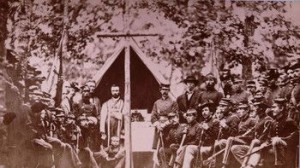 Now safely back in Virginia, the soldiers of Confederate Gen. Robert E. Lee’s Army of Northern Virginia have time to reflect on their disastrous defeat at Gettysburg. Introspective, humble and searching for answers, many turn to religion for an explanation of their defeat and hope for the future. Thus begins a great season of revival in the Confederate Army, chronicled in Southern Baptist newspapers and government records.
Now safely back in Virginia, the soldiers of Confederate Gen. Robert E. Lee’s Army of Northern Virginia have time to reflect on their disastrous defeat at Gettysburg. Introspective, humble and searching for answers, many turn to religion for an explanation of their defeat and hope for the future. Thus begins a great season of revival in the Confederate Army, chronicled in Southern Baptist newspapers and government records.
Confederate Gen. Robert E. Lee this week issues General Orders #83, setting the tone for the heightened revival atmosphere.
The President of the Confederate States has, in the name of the people, appointed the 21st day of August as a day of fasting, humiliation and prayer. A strict observence of the day is enjoined upon the officers and soldiers of this army. All military duties, except such as are absolutely necessary, will be suspended. The commanding officers of brigades and regiments are requested to cause divine services, suitable to the occassion, to be performed in their respective commands. Soldiers! We have sinned against Almighty God. We have forgotten his signal mercies, and have cultivated a revengeful, haughty, and boastful spirit. We have not remembered that the defenders of a just cause should be pure in his eyes; that “our times are in his hand”-and we have relied too much on our own arms for the achievement of our independence. God is our only refuge and our strength. Let us humble ourselves before him. Let us confess our many sins, and beseech him to give us a higher courage, a purer patriotism and more determined will: that he will convert the hearts of our enemies: that he will hasten the time when war, with its sorrows and sufferings, shall cease, and that he will give us a name and place among the nations of the earth.
A soldier in Company D, 31st Georgia regiment adds his own perspective, reinforcing oft-repeated editorials in Baptist newspapers:
I believe we as a nation have incurred the displeasure of a just God, and have been exceedingly wicked, and that is the cause of this war, and the reverses we have met with of late have all been for our good and to make us more humble and to have a firm reliance in Him who doeth all things well…if we fail to put our confidence in Him, how soon may the tide of success be turned against us?
Meanwhile, many Baptist churches of the Confederacy are also experiencing revival, as indicative of one such account written this week and later published in the North Carolina Biblical Recorder:
Dear Bro. Hufham:–I have just closed a protracted meeting in our village, which resulted in the conversion of twenty persons.
Yesterday I baptized fourteen in the presence of an immense congregation, and there are others yet to be baptized. Since the first of the month twenty-five have been baptized into the fellowship of the Madison church, including some of the most interesting young men and ladies of the community.
Brethren J. L. Carroll and T. H. Jones labored faithfully and won the affections of the whole congregation. The Lord has done great things for us, whereof we are glad.–To His name be all the glory.
Your unworthy brother,
L. H. Shuck
N. B. I baptized some time ago a lady who had been a Methodist nearly thirty years.
As does the venerated Confederate general, many white Confederates see the army and home front revivals as an affirmation of the righteousness of the Confederacy and its “just cause” of African slavery.
Will time prove them right?
Sources: Confederate Gen. Robert E. Lee, General Orders, No. 83, August 13, 1863 (link); Gregory C. White, This Most Bloody & Cruel Drama: A History of The 31st Georgia Volunteer Infantry, Baltimore, Maryland: Butternut and Blue, 1997, p. 104; Troy D. Harman, “The Great Revival of 1863: The Effects Upon Lee’s Army of Northern Virginia,” National Park Service (link); Andrew Scott Bledsoe, “We Are a Spectacle to God”: The Phenomenon of Confederate Revivalism,” Henderson State University, 2006 (link); Letter, L. H. Shuck, Biblical Recorder, August 26, 1863 (link); see also Bruce T. Gourley, “Recent Historiography on Religion and the American Civil War” (link)


